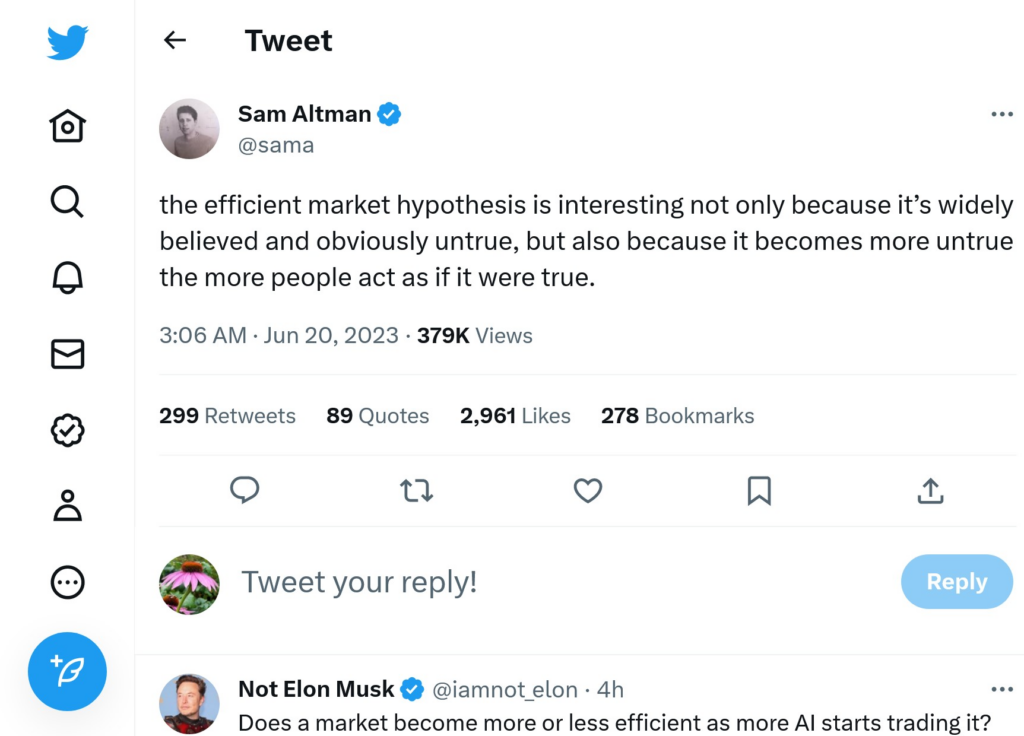The Efficient Market Hypothesis (EMH) has long been a topic of interest and debate among economists and financial professionals. It posits that markets are efficient and that prices reflect all available information. However, this hypothesis encounters a paradox when considering the influence of behavioral biases and market anomalies.
The Efficient Market Hypothesis Conversation of the G.O.A.T.s
In a thought-provoking Twitter conversation between Sam Altman, the CEO of OpenAI, and Not Elon Musk, Not the CEO of Tesla, this paradox was brought to the forefront:

Sam Altman’s statement challenges the validity of the EMH and raises questions about the notion of market efficiency.
Not Elon Musk then posed a question that delves into the heart of the matter: „Does a market become more or less efficient as AI starts trading it?“ To explore this question, we must first understand the assumptions underlying the Efficient Market Hypothesis.
Information Efficiency versus Behavioral Biases
EMH assumes that the market participants make rational decisions based on all available information. This is not the case. Extensive research in behavioral finance has revealed that individuals are prone to cognitive biases that hinder rational decision-making.
One such bias is overconfidence, wherein investors overestimate their own abilities and believe they can consistently outperform the market. This often leads to excessive trading and poor investment choices. Additionally, confirmation bias, anchoring bias, herding bias, loss aversion, and the gambler’s fallacy are among the many biases that influence decision-making in financial markets.
These biases highlight the fact that the EMH’s assumption of rational decision-making is flawed. Here, Not Elon Musk’s question becomes particularly pertinent: „Does a market become more or less efficient as more AI starts trading it?“
Efficient Market Hypothesis and AI Bias
Contrary to the assumption that AI is free of biases, we must recognize that AI systems also exhibit biases, albeit at a different level. For instance, over-optimization bias can emerge when a trading or investment system is excessively fine-tuned to historical data, resulting in suboptimal performance in the future.
AI systems may yield impressive wins, but they can also suffer significant losses due to inherent biases and limitations. Therefore, assuming that AI eliminates bias entirely would be misguided.
Sapere Aude
In the era of Artificial General Intelligence (AGI), the imperative of Sapere Aude, or „Dare to be wise,“ becomes highly relevant. It calls for a critical examination of the Efficient Market Hypothesis and an acknowledgment of the interplay between market efficiency, behavioral biases, and the growing influence of AI.
As we strive for greater understanding and wisdom in financial markets, it is crucial to recognize the complexities and contradictions inherent in the EMH. The paradox between market efficiency and behavioral biases reminds us that a nuanced approach, incorporating both human judgment and AI capabilities, may hold the key to navigating the intricate landscape of investment and trading in the future.
The Efficient Market Hypothesis presents a paradox that challenges its own assumptions. By acknowledging the existence of behavioral biases and the biases inherent in AI systems, we can embark on a journey of exploration, seeking a balance between market efficiency and the realities of human decision-making and technological advancements.
In conclusion, the imperative Sapere Aude stays highly topical in the age of AGI:
Dare to be wise.
horace
Artikel aktualisiert am 26.06.2023
Edith Noerthemann ist Diplomkauffrau mit der Diplomnote 0,7. Sie verbindet analytische Tiefe mit Innovations- und KI-Kompetenz. Sie begleitet Unternehmen im Umgang mit Ambiguitäten und hilft dabei, Kreativität zu kultivieren und sie als echte Wettbewerbsvorteile zu nutzen.
